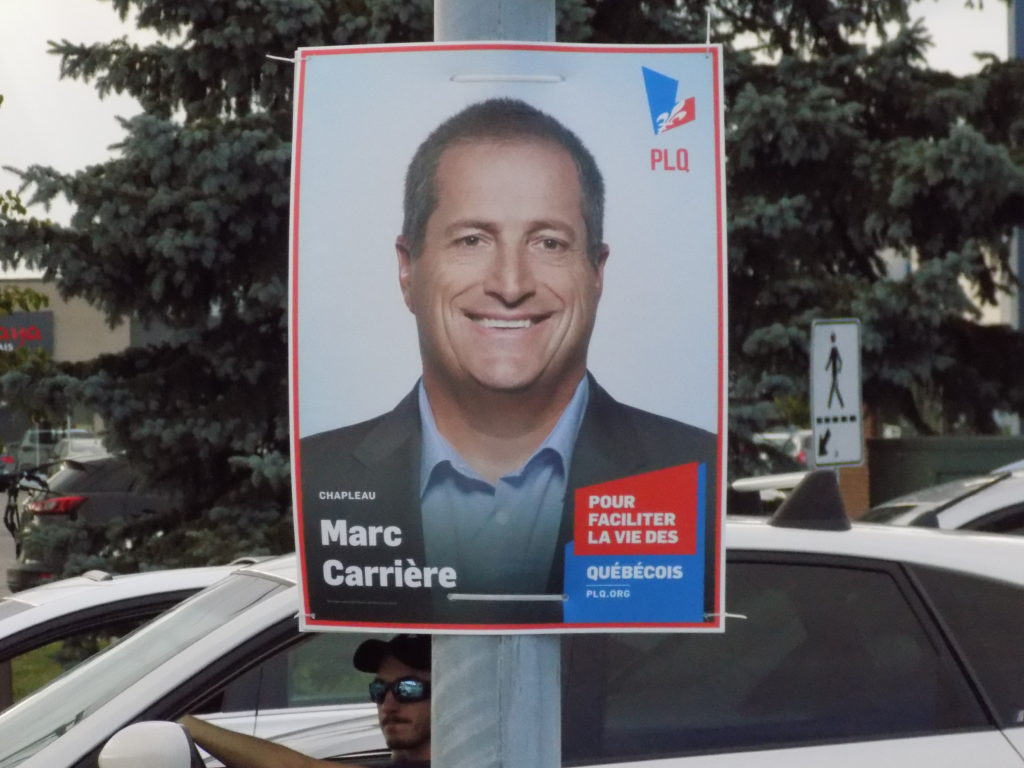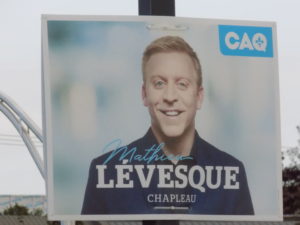Who’s who in the Quebec election campaign

Québec Liberal Party campaign sign for the candidate in the Chapleau district in Gatineau. Photo: James Morgan
Québec’s provincial election is on October 1. Voters will decide if the Liberal government led by Premier Philippe Couillard should be given another four years in office or if it’s time to give another party an opportunity.
The big success of the Couillard government is how it has managed Québec’s finances; the budget has been balanced for three years in a row, but that’s come at another kind of cost many are not willing to pay. Funding for services has been cut or not increased, particularly in health and social services.
It is not unusual to wait for several hours to see a doctor at a hospital emergency department for minor problems. There is also a chronic shortage of family physicians and other health care professionals. The result is that in communities along the boundary with Ontario, many Québec patients are going to see doctors and use hospital emergency departments in communities there instead.
Public employees have been notoriously angry about cuts and difficult union contract negotiations. Stickers protesting the government became a common sight on windows of government buildings and vehicles in the provincially-operated ambulance fleet.
There are six main political parties running in this election. None of them really have any direct parallels with their Canadian federal counterparts except for a couple of common names. The incumbent Liberal Party of Québec led by Philippe Couillard hasn’t been affiliated with the Liberal Party of Canada since the 1950s. They’ve taken a centrist to mildly right alignment over the past four years. They support Québec remaining part of Canada but are strong on maintaining Quebec’s own identity. In fact, every party in Quebec is strong on that to varying extent.
The Coalition Avenir Québec (CAQ—the “Future Québec Coalition”), is led by Francois Legault. Labelled as a conservative party by some because of its emphasis on fiscal responsibility, it likes to describe itself as a coalition of people of various backgrounds who want to do what’s best for citizens. Agnès Grondin, a CAQ candidate, recently described her party in similar words to me. Right now, the CAQ is about 10 points ahead of the Liberals in opinion polls and is seen as the most-likely to win on October 1.
There’s also a more right-leaning Conservative Party of Québec that has minimal support. It was only re-formed in 2009 after being dormant since the 1930s.

Campaign sign for a Coalition Avenir Québec candidate in the Gatineau district of Chapleau. Photo: James Morgan
Yielding left, there are three parties; all have similar ideas that run the risk of fragmenting the leftist vote. There’s the Parti Québécois (PQ) led by Jean-François Lisée, which despite a two-year stint in office from 2012 to 2014, it hasn’t held power for a full four years since 2003. The PQ was once a political powerhouse, it governed from 1976 to 1985 under separatist stalwart and social democrat René Lévesque. It almost took Québec out of Canada twice; first with the referendum of 1980 and then the 1995 vote that it came very close to winning. The PQ veered right around the turn of the century but Patrick Côté, the candidate in the Argenteuil district, recently assured me that “We’ve returned to the base of the past.”
The New Democratic Party (NDP) has a provincial version in Québec for the first time ever. It remains to be seen how successful its efforts will be. The federal NDP is suffering in Québec right now. It lost many of seats there in the last federal election. Several federal NDP Members of Parliament have said they are not running again. This could have an impact on provincial NDP fortunes.
Further left yet is Québec Solidaire (Solidarity Québec). It’s a boldly democratic socialist group that already has three seats in the legislature. In a very cooperative, socialist fashion, the party does not have a single person as its leader. Rather, it has two spokespeople, one is former student activist Gabriel Nadeau-Dubois, a leader of the 2011 protests tuition against fee increases at public universities. The other spokesperson is Manon Massé, a social justice, LGBTQ, and feminist activist. I recently spoke with Céline Lachapelle, a Québec Solidaire candidate. She emphasized the party’s strong focus on improving public transit, the environment, and orchestrating Québec’s independence from Canada.
The Québec Green Party is also a contender in the election. It’s hard to call the Greens left or right. They tend to be a coalition of people with various ideologies who are deeply concerned about the precarious state of the natural world. The Greens have been making inroads across Canada in recent years. Their federal leader Elizabeth May has a seat in Parliament. In British Columbia, they are part of a coalition government with the NDP, and the Ontario Greens won their first seat in the Ontario election back in June. Could eco-conscious Québec be next? We’ll know that, and whoever the next Premier and governing party of Québec will be on October 1.







